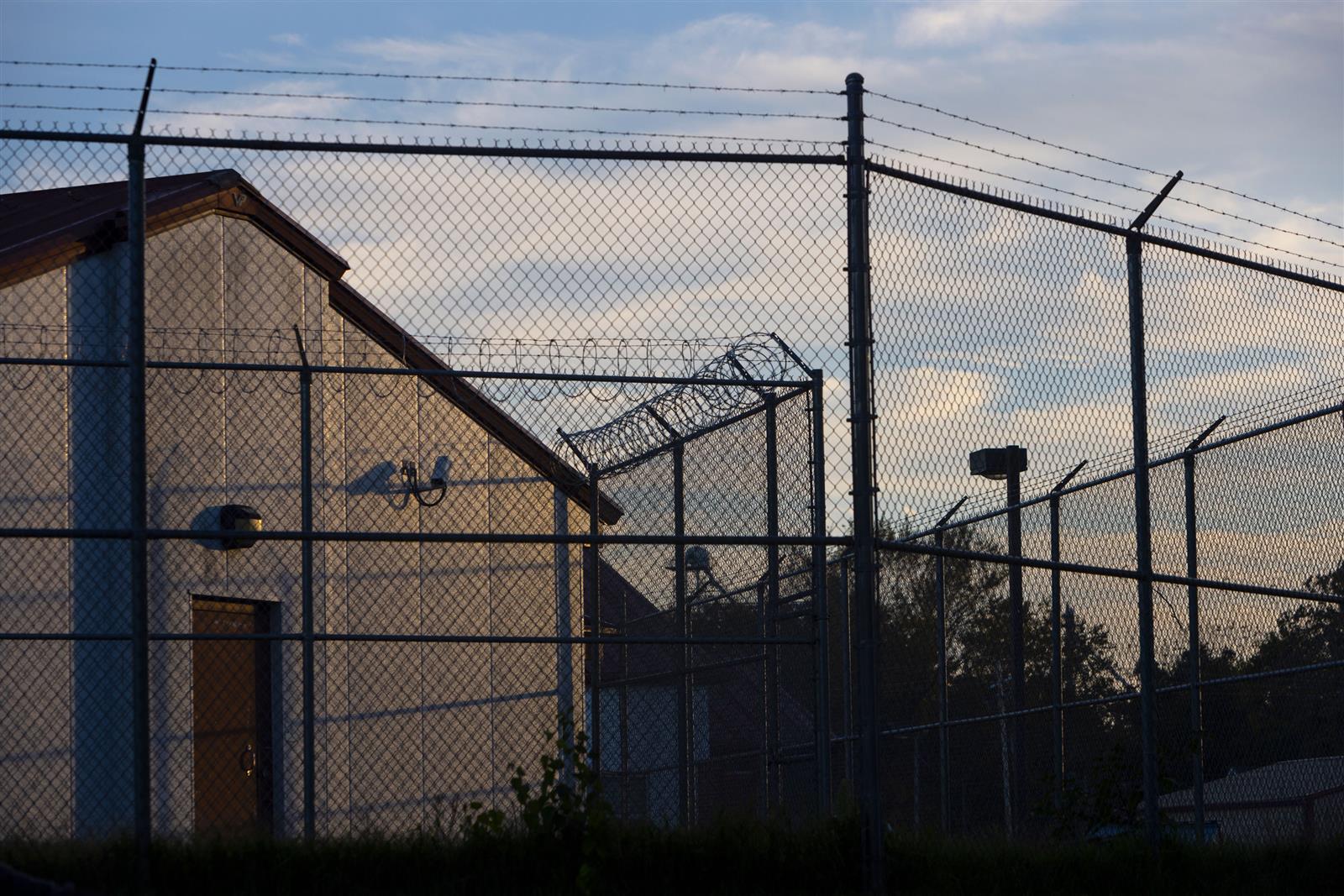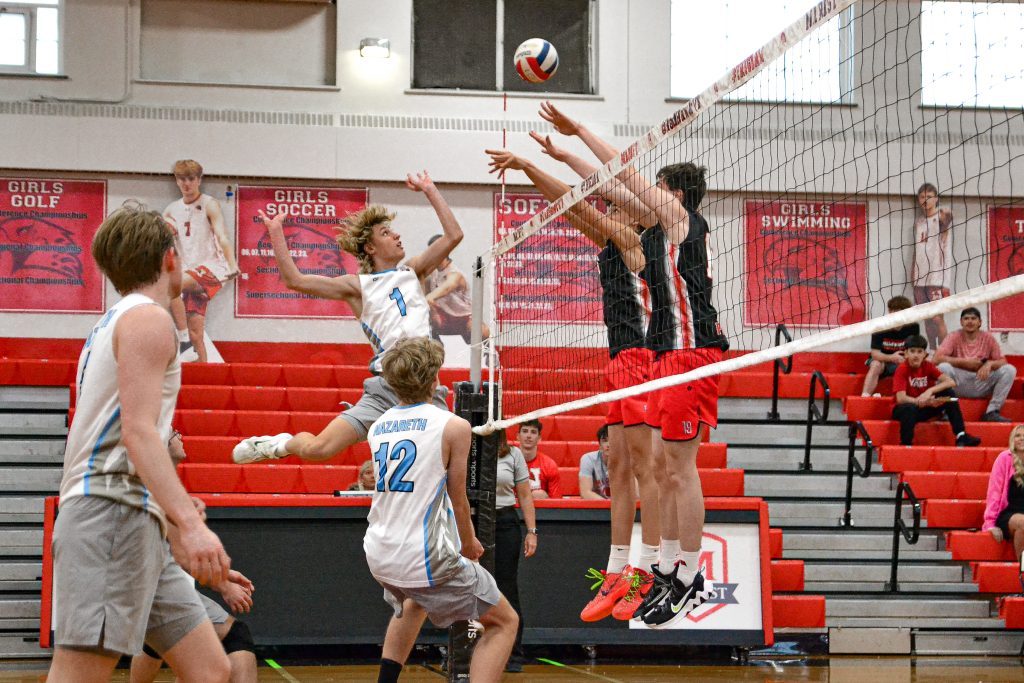
Inside Illinois’ youth lockups, children go without basic services and face “excessive” punishments
By MOLLY PARKER
Capitol News Illinois
news@capitolnewsillinois.com
This article was produced for ProPublica’s Local Reporting Network in partnership with Capitol News Illinois.
In late December, a teenage boy with a broken arm was left to suffer alone in his cell at a youth lockup in rural southern Illinois. Staff were aware he’d been seriously injured; he told them he was in pain and asked to see a doctor. Two hours passed before staff took him to the hospital, during which they cooked and served dinner and took a group of kids for recreation, he claimed.
Almost everything had gone wrong that day, at a place where things went wrong a lot. Four months earlier, a state audit had called the Franklin County Juvenile Detention Center in rural Benton a “facility in crisis” because it was routinely keeping kids locked up for upwards of 24 hours at a time, a “significant violation” of state standards. It had failed to offer them much in the way of mental health or educational services, the audit said. An overwhelmed and undertrained staff routinely called on the sheriff’s department to help keep the youth in line, even for seemingly minor behavioral disruptions, according to additional law enforcement records obtained by Capitol News Illinois.
All of that was evident on this particular day, when the residents were told they’d get a rare treat, an hour or so inside the facility’s gymnasium.
But once in the gym, the boy got into a shouting match with another youth and staff ordered him back to his room. Devastated to lose his rare gym time, he refused to go. Deputies from the sheriff’s office across the street rushed in — several men who were much bigger than the teen, according to sworn statements that several youth provided for a federal lawsuit the American Civil Liberties Union of Illinois filed against the detention center this summer.
The lawsuit alleges widespread failures, namely that the detention center had violated youths’ constitutional rights by subjecting them to excessive forms of restraint and seclusion while denying them adequate education and mental health services. The children who are confined there are “uniquely vulnerable, many having already suffered harrowing abuse and trauma” — and instead of caring for them, the lawsuit claims, the facility subjected them to “inhumane conditions” known to cause lasting harm.
Melissa Morgan, chief judge of the 2nd Judicial Circuit Court of Illinois, whose office is ultimately charged with running the facility, did not return phone calls seeking comment, though an assistant confirmed she had received the messages. In a court filing last week, Illinois Attorney General Kwame Raoul, who is representing the chief judge and other senior facility staff sued in federal court, denied the allegations of poor care leveled against the facility. The attorney general’s office declined further comment. In a separate filing on Monday, Franklin County, which was also named in the lawsuit, denied the allegations as well.
Youth at the facility said in signed statements taken under oath that the deputies took the boy to the ground, breaking his arm in the process, a claim that is backed up by law enforcement records obtained by Capitol News Illinois and ProPublica.
An excerpt from a youth’s sworn statement entered as evidence by the ACLU in a federal suit against the Franklin County detention center in which he relates how his arm was broken by sheriff’s deputies. (Obtained by Capitol News Illinois and ProPublica. Highlighting by ProPublica.)
“The officer asked me about my arm and I said ‘You know it’s broken. You heard it snap,’” the youth who was injured, identified only by his initials, A.B., said in his signed statement. A.B. is not a plaintiff in the suit, though his statement was included as evidence of the poor conditions alleged by the ACLU. The ACLU is seeking class-action status for the case, and that request is pending before a federal judge.
A month after the incident, the Illinois Department of Juvenile Justice returned to the detention center to see whether the “facility in crisis” had corrected any of the deficiencies cited in the August audit. It had made “some improvements” but “several” deficiencies remained and new ones were identified, the auditor wrote in a report on the visit. He also made note of the broken arm, saying that he could find no proof that anyone at the facility had conducted a review to determine whether staff or the deputies had acted appropriately. Franklin County Sheriff Kyle Bacon, who was among the law enforcement officers who restrained the youth that day, defended his department’s actions but said he could not speak to whether the facility had conducted an internal review because the sheriff’s office is not involved in its administration. Nearly a year later, a spokesperson for IDJJ said the detention center has yet to provide one.
A new analysis by Capitol News Illinois and ProPublica suggests those failures were not unusual. A review of hundreds of pages of state audits, law enforcement records, a federal lawsuit, and reports by oversight and advocacy bodies point to troubling conditions inside many of the state’s 16 juvenile detention centers, which operate much like adult jails, detaining court-involved youth with open cases when a judge determines they are at risk of fleeing or reoffending. The facilities combined can house upwards of 1,200 youth as young as age 10, though they are rarely at capacity.
The records show that youth have been Tased, pepper sprayed and roughed up by staff and law enforcement officers; forced into isolation for days at a time; denied access to their psychotropic medications and mental health treatment; and received little or no schooling, despite state and federal laws mandating that the youth receive educational services while incarcerated. Nearly two-thirds of those who are detained are Black teens.
Poor conditions in juvenile lockups across the country have recently made headlines, bringing renewed calls for reform. What makes Illinois different from many of its state peers is that no independent agency licenses or certifies the youth detention centers. Even in some states that have been heavily scrutinized for problematic conditions inside their youth facilities, such as Louisiana, Tennessee, Michigan and Pennsylvania, a licensing process is in place that allows for sanctions up to closure.
Under state law, the Illinois Department of Juvenile Justice sets standards for county detention facilities that hold youth in custody and conducts audits of them. While the department has repeatedly cited several centers for failing to meet its standards, under state law, IDJJ cannot mandate corrective action plans, issue fines or shut down detention centers found in repeated violation of the rules. Instead, the IDJJ reports are sent back to the county detention facilities’ staff and to the chief judges of each judicial circuit, under whose authority they operate. Neither the staff nor the judges are obligated to respond.
IDJJ shares oversight of the youth detention centers with the Illinois Supreme Court. The high court’s administrative arm implemented its own set of standards for facilities in 2022 and started conducting reviews later that year. In its initial review of the detention centers, the court found that about a third did not meet its standards, and action plans were developed with them to address deficiencies. Christopher Bonjean, a spokesperson for the Illinois Supreme Court, declined to provide the full reviews or any of the ongoing progress reports for facilities requiring action plans, saying that only its initial summary reports are made public. The judicial branch is not subject to the Illinois Freedom of Information Act.
Juvenile justice experts and advocates for incarcerated youth in Illinois say the weak oversight of these facilities needs the attention of lawmakers and policy experts.
And it’s the latest example the news organizations have revealed about the failures of Illinois officials to put an end to the poor treatment of vulnerable populations held in facilities, even when problems are well documented.
Capitol News Illinois spoke with six experts in the field of juvenile justice and youth development who said facilities that detain children should have robust oversight structures. This spring, Equip for Equality, Illinois’ federally designated legal aid organization for people with disabilities, called on policymakers to reform the oversight system “given the longstanding, serious and pervasive problems” inside facilities statewide.
“Would you want nursing homes operated without any oversight? I don’t want nursing homes operated without oversight. So to think we don’t have any kind of oversight and quality improvement for kids that are in custody in a facility, I don’t understand,” said Hunter Hurst, director of the National Center for Juvenile Justice, the research arm of the National Council of Juvenile and Family Court Judges.
IDJJ Director Heidi Mueller said in an interview that she agrees that the agency is limited in what it can do if a county’s chief judge can’t or won’t enforce compliance.
“I think a lot of folks would say that that oversight mechanism isn’t what you would call best practice,” Mueller said. Only the Illinois General Assembly has the authority to change the oversight structure, she said. Mueller stopped short of making a call for lawmakers to do so, saying that’s not her role as an agency leader.
Widespread Problems
Oversight entities have identified numerous problems in facilities across the state. In a March report, Equip for Equality found widespread problems at Chicago’s youth lockup — the state’s largest — including that it had utilized “unjust and excessive use of physical restraints and seclusion, often as punishment, with a wanton disregard of state law.”
In a letter addressed to Equip for Equality, Leonard Dixon, superintendent of the Chicago facility, rebutted the findings, saying that the youth facility follows state and federal laws and that the advocacy group’s claims about unlawful restraints were “unsupported” and that physical restraints are “never used as punishment.” Dixon noted to the news organizations in a statement that recent state audits found the facility to be in compliance with restraint standards.
Concerns about excessive use of force extended beyond Chicago. In April, a youth at the Mary Davis Home in Galesburg, in central Illinois, told an IDJJ auditor of a troubling physical restraint from the day before. After watching a video of the incident, the inspector was so alarmed that he reported it to the state’s child abuse hotline, although ultimately the Department of Children and Family Services did not designate this as a case of abuse or neglect. No other governmental body is charged with reviewing whether administrative policies were properly followed in specific situations. The IDJJ audit noted that one of the staff members involved had not received the training the facility utilizes to teach staff proper restraint techniques.
Wendi Steck, superintendent of the Mary Davis Home, said the employee involved in the restraint incident no longer works there, but she declined to say whether his departure was related to this incident. “Any incidents of abuse of our clients are not tolerated and are dealt with swiftly,” she said. “All staff are trained in Handle with Care restraint and cannot be involved in any restraints until successfully trained.”
Perhaps nowhere are concerns as extensive as those documented at the 32-bed youth lockup in Benton, the only one that IDJJ labeled “in crisis.” The facility is the state’s southernmost detention center and houses youth from across 26 counties — the lower quarter of the state.
Among IDJJ’s findings in its August 2022 audit: Youth were confined to their rooms for upwards of 24 hours for behavioral infractions, though state standards limit the use of seclusion to four hours and allow it only if youths are at risk of harming themselves or others. In fact, because the facility was so short-staffed that IDJJ described the issue as “critical and unsustainable,” youth were kept in their rooms for most of their days there, even if they had not acted out. The facility has a gym and outdoor recreation area, but youth had not utilized either area for two years. The facility had no process for assessing youth to determine if they were at risk of sexual assault or of sexually assaulting a peer, a requirement of the federal Prison Rape Elimination Act. Mental health services were “minimal” and “there was an obvious lack of training” among the staff.
Staff at the Benton facility told the IDJJ auditor that at one time, it had utilized the Crisis Prevention Institute to train staff on how to try to calm situations before they escalate and how to properly use physical restraints if it can’t be avoided. But a supervisor acknowledged to the IDJJ inspector that such training had not been conducted in several years and that some newer employees may have never received it. “This poses a high risk for potential liability for the county,” IDJJ wrote in the audit.
Joseph A. Cervantez, the state’s attorney in Jackson County, one of the counties from which youth go to the Benton facility, said he was so alarmed when he read the report that he immediately stopped sending youth there. Without better services, he said, “I might as well just keep them out on the street.”
When IDJJ followed up in January, it found that many problems had not been corrected in the intervening five months. It also criticized the facility’s handling of the broken arm incident. Detention center staff told the auditor that its video system was faulty and didn’t record what happened. A senior official told the auditors that an internal review had been conducted but could produce no written record of it. While the standards do not stipulate the use of video cameras inside the facilities, any use of restraint or seclusion requires a full written report.
Bacon, the sheriff, said his office conducted an internal review consisting of a conversation between him and the chief deputy about what had transpired. “I was present and I was familiar with what was happening and the actions that we took, and there were no issues with those actions,” he said.
While IDJJ’s reports cited extensive problems, claims made by five youth who provided statements for evidence as part of the ACLU’s lawsuit, filed in July, suggested even more dire conditions. The youth said they were locked inside “very small concrete boxes” covered in black mold and that they were forced to eat their meals alone in their cells next to their toilets and sleep on wet mattresses because the windows leaked. One youth said he was experiencing a mental health crisis and cut his arm with a broken colored pencil. “Instead of getting me any mental health treatment, they just gave me a paper towel to clean up the blood,” he said.
The presence of law enforcement officers inside the facility is common, several of them said. “The crazy thing is the police don’t even just come in for fights or big things, they come in just when a kid doesn’t want to move and they do things that the staff should be doing,” said another youth.
Law enforcement records obtained by Capitol News Illinois showed that staff called on sheriff’s deputies 21 times between September 2021 and August 2023. Some of the calls were for seemingly minor incidents. For instance, on Aug. 1, staff requested backup because a youth had “stuffed snacks down his pants and won’t give them back.”
Part of a call log showing reasons why staff of the Franklin County Juvenile Detention Center called sheriff’s deputies into the facility. (Obtained by Capitol News Illinois and ProPublica.)
In some cases, the arrival of deputies resulted in more aggressive restraint techniques than are typical for — or allowed in — juvenile detention centers. In October 2022, detention center staff called for backup because a different youth had refused to return to his cell. When the deputies tried to force him back to his room, the youth assumed a fighting position, the responding deputy wrote in a report, so the deputy fired his Taser.
Staff in juvenile lockups are not allowed to use stun guns on youth, according to IDJJ.
Bacon said he believes the staff call on the sheriff’s deputies because of their ability to utilize tools, such as stun guns, that the facility staff cannot.
He said that he and his staff are trained in deescalation techniques and use force only when necessary. “There are youth that can cause harm to you,” Bacon said. “And we want to use the least amount of force necessary, but at the same time we have to protect ourselves from being injured as well as the youth. That’s not our intention to hurt anyone.” He also said that as he understands the law, his office is not bound by IDJJ standards, even when officers are responding to an incident inside a facility that is under those rules.
In a statement, IDJJ said it does not consider calling for outside law enforcement alone to be a violation of any standards, though “the standards would apply to how force, if any, is used.”
The agency said it had not been aware of the stun gun incident until they were alerted to it when they returned for an audit in late September. That audit is not complete and has not yet been made public.
Oversight Breakdown
Two years ago, IDJJ updated its standards for the operation of juvenile detention centers, incorporating language that emphasizes youths’ education and mental health and stresses appropriate use of restraint and seclusion. Its reports, available online, became more robust. But while they have helped bring problems to light, said Rachel Shapiro, a managing attorney with Equip for Equality, her agency is still identifying some “horrific” conditions that never appear in IDJJ audits.
And although it can document problems it has identified, IDJJ’s authority to ensure they are fixed is limited.
The law does allow the state agency to petition a court to order a facility into compliance if it hasn’t fixed deficiencies within six months of receiving notice from IDJJ. But IDJJ said the agency is “not aware of any instances” of agency staff initiating such a process, in part because it would have to petition the very courts that run them.
The Illinois Supreme Court is also limited in what it can do. Its standards say that the court “shall” withhold 10% of the salary reimbursements it provides to any facility that remains out of compliance 90 days after receiving notice, and another 10% monthly thereafter. But it has not financially sanctioned any facilities.
Instead, Bonjean said, a special unit within the Administrative Office of the Illinois Courts is closely monitoring any facilities that are still working through their corrective action plans.
A spokesperson for the state Supreme Court said that the Franklin County facility is making improvements but is not in compliance with its standards. (Julia Rendleman for ProPublica)
The court spokesperson declined to provide the news organizations with the court’s full review of the Benton facility, its action plans or its progress reports. He confirmed that it remains out of compliance 14 months after the review but said that it is “making progress.” The county has approved funds for needed repairs and improvements to the facility, he said, but they will “take some time.” Reducing funding, he said, “could be problematic and could hinder the progress we are trying to achieve.”
John Albright, IDJJ’s chief of performance and innovation, who conducts the audits for the agency, said he also tries to work closely with facility staff to help them understand the standards and how to meet them.
“Some facilities have been working very hard to make changes, and others maybe not as much,” he said.
When the oversight entities don’t compel action, the only option remaining for those who feel they were harmed by the system is a lawsuit, advocates say. Kevin Fee, an attorney with the ACLU of Illinois, said his organization is concerned about conditions across facilities. But those found in Benton were “far and away” the most troubling, he said.
“The Franklin County reports were pretty scathing, and we would have expected more action in response to those reports,” Fee said of the IDJJ audits. “But we didn’t see any, which is why we felt the need to bring the lawsuit.”
Jennifer Vollen-Katz, executive director of the John Howard Association of Illinois, an independent watchdog organization, agreed that even with the improved standards, there are still shortcomings with “system transparency and concerns about the treatment and conditions youth experience while in detention.”
The weak enforcement mechanisms are “a real deficiency in the state of Illinois,” she said. “We have work to do so that we’re not just inspecting these facilities and reporting on the issues. There has to be some way of holding the detention centers accountable and responsible for the treatment of youth in their custody short of litigation.”
Local News

Palos East fifth-grader wins Scholastic Storyworks writing contest
Spread the loveGabriel Chowaniec, a fifth-grader at Palos East Elementary School, has been named a winner of the Scholastic Storyworks Magazine writing contest. Gabriel, who is a student in Cathy Casey’s fifth-grade classroom, was named one of only five winners nationally for the December 2023/January 2024 competition. Garbriel’s submission for the nonfiction story “The Shattered Land,” “showed a strong understanding of the text along with the ability to author a well-organized…

Shepard celebrates Autism Week
Spread the loveBy Kelly White World Autism Acceptance Week is organized by the National Autistic Society in the first week of April and aims to raise awareness about the challenges autistic people face across all areas of society. Not missing out the opportunity to celebrate all-inclusion was Shepard High School, 13049 S. Ridgeland Ave., Palos…

Billions of cicadas get ready to raise a racket
Spread the loveBy Kelly White If you haven’t heard the buzz yet, you will soon. With 2024 marking a big year for periodical cicadas in Illinois, billions of the red-eyed buggers will soon be making an appearance. Periodical cicada broods XIII and XIX will be emerging throughout much of the state at the same time.…

‘A man of honor, a beacon of kindness’
Spread the love. Chicago weeps for Officer Luis Huesca . By Tim Hadac People across the Southwest Side shed tears earlier this week, as throngs of police officers and other filled the St. Rita of Cascia Shrine Chapel at 77th and Western for a funeral Mass for CPD Officer Luis M. Huesca. Officer Huesca was…

Archer Manor Little League starts its 2024 season
Spread the love. Sunny skies and mild temperatures greeted the boys and girls, moms and dads, umpires and coaches, and everyone else participating in Archer Manor Little League’s Opening Day parade and ceremonies at Archer Park. Since 1952, AMLL has provided athletic opportunities for thousands of boys and girls in Archer Heights, West Elsdon, Central…

Dread over car drifters on streets
Spread the love. Reckless drivers take over SW Side intersections . By Tim Hadac At the April meeting of the Garfield Ridge Neighborhood Watch, a police officer admitted that the drag racing/drifting phenomenon seen and heard in the Midway area in recent years “probably will increase, but we hope not.” The admission was triggered by…

Don’t raise pilots’ retirement age, García says
Spread the love. From staff reports U.S. Rep. Jesús “Chuy” García (D-4th), senior member of the Transportation and Infrastructure Committee, recently led a letter joined by 121 Members of Congress urging House Democratic leadership to reject any changes to the pilot retirement age in a final version of the Federal Aviation Administration (FAA) reauthorization bill.…

CTA launches ‘chat’ feature on website
Spread the love. From staff reports Artificial Intelligence has made another step forward at the Chicago Transit Authority. CTA officials recently launched the “Chat with CTA” chatbot, a new virtual automated service featured on transitchicago.com. The communication tool allows riders to report issues, provide feedback and receive answers in real-time. Additionally, it provides the CTA with customer…

New effort to aid kids with disabilities
Spread the love. From staff reports A new grant program aimed at providing financial assistance to families of children with disabilities was launched recently by Mayor Brandon Johnson, in partnership with the Mayor’s Office for People with Disabilities and Ada S. McKinley Community Services. Children with disabilities is a population disproportionately affected by the pandemic,…
Neighbors

Sisters make Chicago Lawn a world destination
Spread the love. Kathy Headley Your correspondent in Chicago Lawn and Marquette Manor 6610 S. Francisco • (773) 776-7778 . Earlier this month was the Fifth Lithuanian Documentary Film Festival, with distinguished guests from Lithuania and other parts of the United States visiting the neighborhood. They held a photo session in the editorial office of…

Happy Mother’s Day to everyone, everyone
Spread the love. By Mary Stanek Your correspondent in Archer Heights and West Elsdon 3808 W. 57th Place • (773) 517-7796 . Yet another Mother’s Day is upon us. I wish everyone a happy day. By everyone I do mean everyone. There are a lot of dads who do it alone, along with important mother…

Mother’s Day is truly a day to be celebrated
Spread the love. Peggy Zabicki Your correspondent in West Lawn 3633 W. 60th Place • (773) 504-9327 . Mother’s Day happens on Sunday, May 12. If this isn’t something to celebrate, I don’t know what is. Motherhood means new life, new beginnings, new possibilities. Even if you won’t be seeing your mom, you can still…

Saint Xavier men’s volleyball finishes historic season in nation’s top 4
Spread the loveBy Jeff Vorva Correspondent The Saint Xavier men’s volleyball team made history by advancing to the semifinals of the NAIA Men’s Volleyball National Championship. But the Cougars fell to eventual national champion Georgetown (Kentucky), 25-21, 25-23, 22-25, 21-25, 15-10, on May 3 at Alliant Energy PowerHouse in Cedar Rapids, Iowa. Although there was…

St. Francis first baseman Nate Maliska earns conference POW honors
Spread the loveBy Mike Walsh Correspondent The University of St. Francis sophomore first baseman Nate Maliska was chosen the Chicagoland Collegiate Athletic Conference’s Player of the Week in baseball for April 7. In helping the Saints to four wins that week, Maliska went 9-for-15 (.600) with eight RBI and seven runs scored. The St. Laurence…

Baseball | Marist claws way back to .500
Spread the loveBy Xavier Sanchez Correspondent This season has thus far not been what Marist had expected, but the RedHawks came into this week at .500. Marist was 2-8 after 10 games this season, with three of those first eight losses coming via shutout. But the RedHawks turned things around with a stretch of eight…

Red Stars fall to Spirit for third loss in past four matches
Spread the loveBy Jeff Vorva Correspondent After enjoying one of their best starts in franchise history, the Chicago Red Stars have slid to the middle of the NWSL standings, with the latest setback being a 4-2 loss to Washington at SeatGeek Stadium. The Stars (3-3-1) entered this week having dropped three of their past four…

Red Stars take aim at NWSL attendance record with Wrigley game
Spread the loveBy Jeff Vorva Correspondent The Chicago Red Stars are thinking big when it comes to their upcoming game at Wrigley Field. The team is taking aim at the NWSL record for single-game attendance when it hosts Bay FC at the historic home of the Chicago Cubs on June 8. The record is held…

IHSA announces boys volleyball postseason assignments
Spread the loveBy Jeff Vorva Correspondent Last year, the area sent a pair of boys volleyball teams to state as Lyons finished runner-up to champion Glenbard South and Brother Rice lost in the quarterfinals. This year, both could face each other in the sectional finals. The Lions picked up the second seed and the Crusaders…







